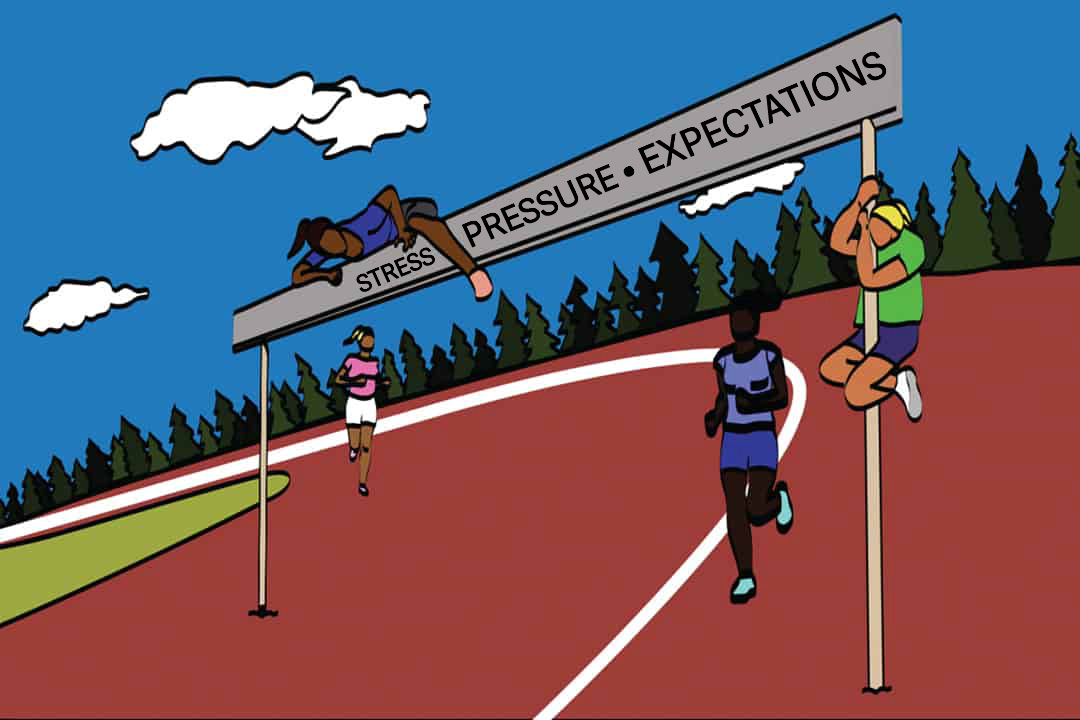Recently, many people have been having a conversation about the mental well-being of elite athletes, sparked by a few high-profile athletes withdrawing from major sport competitions. Naomi Osaka’s recent withdrawal from French Open months ahead of the Tokyo 2020 games, where she cited mental health concerns, was followed by Simone Biles pulling out of the Olympics finals for similar reasons.
These withdrawals have brought to light an often overlooked topic. The prevalence of symptoms of mental disorders among Canadian high-performance athletes was the subject of study in a recent paper by Zoë Poucher, a PhD candidate at the Sport and Performance Psychology Laboratory in U of T’s Department of Kinesiology and Physical Education. Poucher looked at the role that different stressors play in the development of symptoms of mental disorders among athletes, and whether athletes are disproportionately affected by mental health issues.
The Varsity also reached out to current Varsity Blues student athlete Natasha Athanasakos and Alicia Brown, former Varsity Blues athlete turned two-time Olympian, to discuss their experiences around dealing with mental health as elite athletes.
The impact of stress
Results from Poucher’s study indicated that elite athletes may be more likely to develop symptoms of common mental disorders — depression, anxiety, and eating disorders — than the general Canadian population. Poucher used a stress process model, which takes into account the varying resilience different athletes might have to stress and pressure to analyze the factors that lead to symptoms of mental disorders in athletes.
The model accounts for how different stressors affect various components of one’s life, including how external factors in a person’s life can help manage their stress, explained Poucher. Experiencing stress does not directly translate into adverse effects on mental health.
The paper also says that strong coping mechanisms “reduce the negative impact of stress on mental disorders.” In general, a person’s likelihood of developing symptoms of mental disorders is dependent on the types of stressors they experience and their access to support networks.
Poucher highlighted that “[For athletes,] the focus on athletic performance and achievement in an athletic domain is prioritized over everything else.” This can drive elite athletes away from developing diverse human experiences outside of sport.
There is no definitive framework tailored to the mental health needs of elite athletes. However, Rosemary Purcell and some of their fellow researchers at the University of Melbourne suggest building an early intervention network for athletes. Purcell’s comprehensive framework considers various elements of an elite athletes’ support network, such as regular mental health monitoring, peer mentoring, and accounting for athlete preferences when seeking help.
In a survey conducted for the study, just over 41 per cent of athletes surveyed reported symptoms of one or more mental disorders, with 17 per cent reporting symptoms of depression and nine per cent reporting symptoms of depression and generalized anxiety disorder.
A Varsity Blues athlete’s reflection
In an interview with The Varsity, Natasha Athanasakos, the Varsity Blues 2019–2020 female rookie of the year, talked about her journey to mental wellness as a women’s ice hockey player during the pandemic. Although Athanasakos said that the disruption that the pandemic caused to her training took more of a toll on her than she thought it would, she expressed gratitude to her social support network for keeping her mentally fit.
A sense of mutual understanding allowed Athanasakos and her teammates to empathise with each others’ struggles. “When we are now back in a time when we are playing [again], we are able to build each other up and support each other, because we are all on the same path,” Athanasakos said.
Athanasakos also opened up about her struggle with feeling a loss of purpose during the pandemic. “I had lots of anxiety, which I’m okay talking about because I realized, speaking to other athletes, [that] they had the same issues,” she said. Her anxiety was spurred by uncertainty around returning to school and training, and struggling to find motivation.
One of the most helpful resources was a sport psychiatrist that Athanasakos has known since her first year. She felt comfortable going to someone who was familiar with her situation, and seeing a psychiatrist helped her learn how to deal with her feelings alongside her teammates when the team was affected with mental health issues.
Influence of media on athletes’ mental health
Poucher noted that the attitude on social media toward athletes and their mental health is “definitely changing for the better” — although she thinks it’s happening slowly. She hopes that more and more prominent athletes speaking up about their mental health issues will help normalize them.
In an interview with The Varsity, former Varsity Blues athlete Alicia Brown spoke about her own experiences with being on the world stage and dealing with mental health as an Olympic athlete.
At the Tokyo 2020 games, Brown intentionally took time off from social media to focus on mentally preparing for her competition. The feeling of wanting to constantly engage with friends and family over social media can be a huge distraction, and can even be detrimental to athletes at times. “So much of performance is mental,” Brown noted.
She could anticipate what pressure she would feel from social media because of her experiences in the 2016 Olympic games. “I knew I needed to create boundaries for myself [to stay] in a healthy mental space,” she said.
Brown also shared her experience with the news media, where she’s found that athletes are always expected to present themselves in their peak condition. “Often, that means putting [our] own well-being and truth aside,” Brown said. She also added that this pressure from the news media can create lasting effects on how athletes see or feel about themselves.
Despite the challenges she and other athletes face in their athletic careers, Brown is motivated to stay in sports. “What motivates me to run and to be in sports is the impact that I can have on the younger generation… and fighting for a goal,” Brown said.


